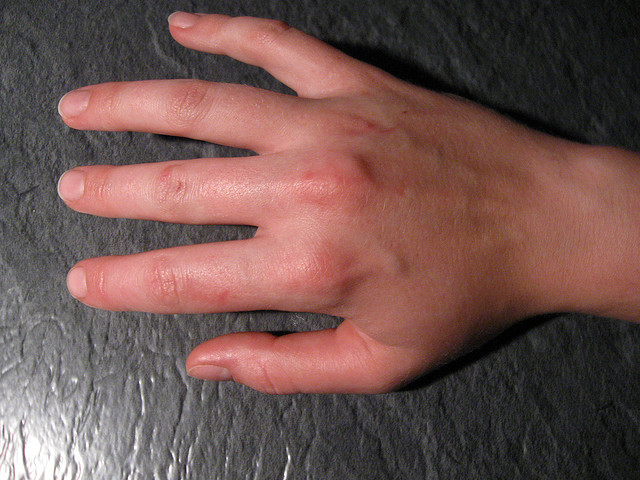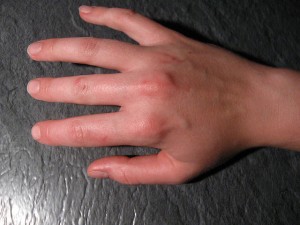
 When I was going through chemotherapy, I experienced a difficult side effect that I never expected-fluid retention. I had prepared myself for hair loss and fatigue, but if anything I thought I would lose weight, not look like I had gained it because my face, arms, hands, and feet were swollen and I looked puffy!
When I was going through chemotherapy, I experienced a difficult side effect that I never expected-fluid retention. I had prepared myself for hair loss and fatigue, but if anything I thought I would lose weight, not look like I had gained it because my face, arms, hands, and feet were swollen and I looked puffy!
“Has anyone else had trouble with fluid retention/swelling?” writes survivor ColleenN. “All of a sudden in the past week I put on over 7 pounds with lots of swelling in my ankles, and some in my knees, stomach, and hands. My ankles weren’t even this puffy when I was pregnant.”
Fluid retention occurs when your body can’t remove fluid from the tissues as easily as usual, so it remains longer than it should, building up in certain areas like the hands and feet. The lymphatic system, hormones, and your diet can all play a part in swelling, as these are the key players in fluid buildup and removal.
Cancer and cancer treatments can cause fluid retention for several reasons, including: 1) hormonal changes from your therapy; 2) the effects of the drugs themselves (many drugs can cause fluid retention); 3) related heart disease, liver disease, or kidney failure; 4) a blockage in the veins or lymph system; 5) malnutrition; or 6) other effects of the cancer itself. Usually the swelling will occur in the hands, feet, ankles, face, and abdomen, though it can occur anywhere. Swelling may also occur as part of an allergic reaction to medications or other substances.
How can you be sure you have this sort of swelling? If your hands, legs, face, or stomach have swollen up, you can probably recognize it visually, or you may have noticed the weight gain. You can also check for these signs:
- When you press on the skin over the swollen area, it leaves an indentation for a few seconds.
- Your hands feel tight when you try to grasp something or make a fist.
- Your rings, socks, belts, or other pieces of clothing feel tight.
- You feel bloated a lot.
- You feel a shortness of breath, particularly when you lay down.
If you have one or more of these symptoms, be sure to check with your doctor right away, especially if you’re short of breath, the swelling seems to move up your arms or legs, it built up really quickly, or your hands or feet feel cold to the touch. Your doctor may prescribe medications that can help your body release the fluid. Otherwise, try some of these remedies at home:
- Cut down on your salt intake-try not to eat salt at all. Be especially careful of canned soups, lunch meats, bacon and ham, soy sauce, potato chips, and the like.
- If your feet or legs are swollen, elevate them as often as possible by sitting in a reclining chair or on a couch with your feet up on pillows. Try not to stand for long periods at a time.
- Avoid tight clothing, and consider stockings and hose that are made for managing fluid retention (ask your doctor or nurse).
- Weigh yourself at the same time every day. Tell your doctor if you gain or lose five pounds or more in a week.
- Eat bananas and raisins. They’re high in potassium, which helps your body eliminate fluid.
- Use a bag of frozen veggies or a cold towel on swollen ankles and hands.
- Try CV Skinlabs Body Repair Lotion. It’s full of anti-inflammatory and antihistamine ingredients to help calm swollen and stressed skin.
- Try natural diuretics like cabbage and cranberry juice.
- Drink water. May seem counterintuitive, but water helps flush your system of fluids.
Have you experienced this side effect? How did you cope with it?
Sources include:
- Swelling (Fluid Retention). National Cancer Institute. Cancer.gov. http://www.cancer.gov/cancertopics/coping/chemo-side-effects/swelling.
- Swelling. Chemocare.com. http://www.chemocare.com/managing/swelling.asp.
- The Editors of Consumer Guide. “8 Home Remedies for Water Retention.” Discovery Fit & Health. http://health.howstuffworks.com/wellness/natural-medicine/home-remedies/home-remedies-for-water-retention.htm.
Photo courtesy bionerd via Flickr.com.

